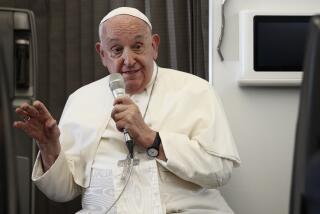The Abortion Issue Has Little, if Any, Effect on the Catholic Vote
“Will Catholics vote against Gov. Carter, Mr. Mayor, because of his abortion stand?” The mayor of Chicago stared at the reporter with the bemused frown he reserved for silly questions. “They don’t vote that way.” Twenty-eight years later, they still don’t vote that way. Nevertheless, in the run-up to the last seven presidential elections, experts on both sides have predicted that the “Catholic anti-abortion” vote would cause trouble for the Democrats, especially given the drift of Catholics from Democratic alignment. Both these “theories” -- a Catholic anti-abortion vote and a Catholic realignment -- are urban folk tales that float around in the collective consciousness of the media with very little basis in fact.
The definitive study of religious realignment in presidential elections was written by Jeff Manza and Clem Brooks in the July 1997 issue of the American Journal of Sociology. The two scholars found that when all relevant variables were taken into account, there had been two major religious realignments since 1950, both of them Protestant. Religiously liberal Protestants shifted to the Democrats and religiously conservative Protestants to the Republicans. Even in elections like the 1984 GOP triumph, when a majority of Catholics followed the national trend and voted for Reagan, Catholics didn’t move to the right nearly as much as white Protestants did.
In the 2000 election, it would appear from available data (such as the 2002 General Social Survey of the National Opinion Research Center and the National Election Study of the Survey Research Center at the University of Michigan) that Catholics were more likely than white Protestants to favor Al Gore, by a margin of about 10 percentage points -- a similar margin to that of John Kerry in current polls. Indeed, according Voter News Service exit polls, Gore did well in states with a substantial number of Catholic voters -- margins of 30 percentage points among Catholics in Massachusetts, 17 in Illinois, 15 in New York, Maryland and Arizona. So much for the realignment to the Republicans.
But what about the Catholic pro-life vote? According to the National Opinion Research Center, or NORC, Catholics and Protestants differ little on a battery of abortion questions; large majorities think that abortion should be available when there is a risk of a defective child, a threat to the mother’s health or a pregnancy caused by rape, while similar majorities reject abortion if the woman is unmarried or cannot afford another child or simply doesn’t want a child. Only 4% of American Catholics consider themselves pro-life on all seven NORC questions, and a third of those voted for Gore anyway, despite his pro-choice stand. One might argue that Catholics should oppose abortion in all circumstances, but in fact they do not.
A useful item to measure the effect of such attitudes is abortion after rape. Among Protestants questioned, 20% reject the availability of abortion in such circumstances, as do 24% of Catholics. The latter group was 10 percentage points less likely to vote for Gore than other Catholics. The net loss of Catholic votes to the vice president therefore was 10% of 24%, or 2.4%. Because Catholics are approximately a quarter of the American population, one quarter of 2.4% is six-tenths of 1%. That is the small amount by which Gore’s popular vote victory would have increased if abortion had not been an issue for some Catholics. Moreover, these calculations assume that abortion was the reason why anti-abortion Catholics did not vote for Gore. So the effect of Catholic abortion attitudes might have been even smaller.
To rephrase the mayor’s comment, most Catholics do not vote on the basis of the abortion issue, and those who do have little effect. What then of the publicity created by some bishops who say Kerry has no right to receive communion and by the bishop of Colorado Springs, who contends that Catholics will lose the right to the sacraments if they vote for Kerry? An ad hoc committee of the bishops on such issues is unlikely to endorse draconian measures of this sort. Moreover, it is improbable that the Catholic hierarchy, disgraced and discredited as it is by the sexual abuse scandal, has the moral high ground to influence Catholic voters any more than it ever did, which was not at all.
*
Andrew M. Greeley, a priest and sociologist on the staff of the National Opinion Research Center at the University of Chicago and the sociology department at the University of Arizona, is the author of “Priests: A Calling in Crisis” (University of Chicago Press, 2004).
More to Read
Get the L.A. Times Politics newsletter
Deeply reported insights into legislation, politics and policy from Sacramento, Washington and beyond. In your inbox three times per week.
You may occasionally receive promotional content from the Los Angeles Times.










